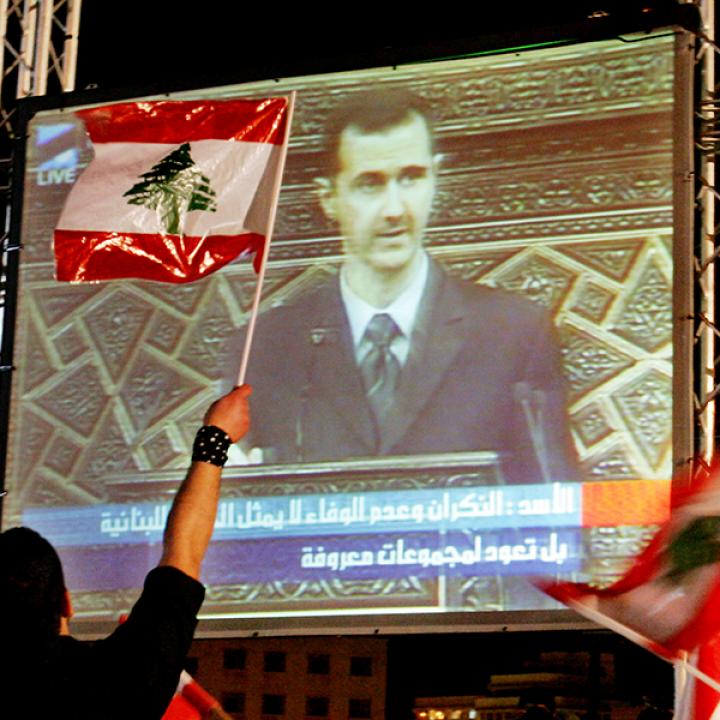
- Policy Analysis
- Articles & Op-Eds
How Syria's Civil War Threatens Lebanon's Fragile Peace

Less than a generation removed from the 15-year civil war that claimed nearly 200,000 lives, Lebanon again appears to be hurtling toward instability.
Three years into the Syrian civil war, neighboring Lebanon is fraying at the seams. Over the last year, as Lebanese Sunni Muslim jihadis and their counterparts in the Shiite militia Hezbollah fought each other in Syria, at least 16 car bombs detonated in Lebanon, in both Shiite and Sunni neighborhoods. In December, a leading Sunni politician was assassinated. Meanwhile, more than 1 million mostly Sunni refugees have streamed in from Syria, increasing Lebanon's population by more than 20% and skewing its delicate sectarian balance.
Less than a generation removed from the 15-year civil war that claimed nearly 200,000 lives, Lebanon again appears to be hurtling toward instability. If not for the Lebanese armed forces, many say, the state would have already devolved into chaos. It's not clear how much longer the army will be able to play this critical role.
The army is widely viewed as a national savior, an indispensable bulwark against the resumption of civil war. In recent years, it has deployed throughout Lebanon, establishing checkpoints at sectarian fault lines and serving as a buffer between warring factions. In the course of this mission, the army has been caught in Sunni-Shiite crossfire and has even become the target of car bombs.
Unlike other narrowly parochial government agencies, the army is the only truly integrated, functioning and "national" institution in Lebanon. It is unique because it reflects the diverse demography of Lebanon, a state with 17 recognized religious sects. More important, in contrast to the Shiite-dominated General Security services and the Sunni-controlled Internal Security Forces, the army is ostensibly nonaligned, affording it broad popular support.
Lately, however, the widespread perception of army neutrality has started to shift, threatening the institution's stature and, potentially, its organizational cohesion.
For the last two decades, the army was tasked primarily with the noncontroversial role of securing Lebanon's 10 Palestinian refugee camps and, on rare occasions, with battling local Al Qaeda affiliates. Although Hezbollah maintained a huge arsenal outside state control, the army never confronted the organization, fearing that such a politically sensitive directive might lead to a split within its ranks along sectarian lines.
But spillover from the war in Syria has complicated the army's traditionally hands-off approach to Hezbollah. The Shiite militia's provision of military support to the Syrian regime has incensed Lebanon's historically restrained Sunnis, and there are signs the community is radicalizing. At the same time, reports suggest that hundreds of armed Sunni militants, some affiliated with Al Qaeda, have crossed into Lebanon from Syria.
The problem is that while the army continues to assiduously avoid hostilities with Hezbollah, it is adopting a more aggressive posture toward Sunni militants. This tack is leading many Lebanese Sunnis to conclude that the army is no longer neutral. It's easy to see how they might reach that conclusion.
Consider, for example, the June 2013 gun battle between the army and Sunni-Salafist preacher Ahmad Assir and his supporters in Sidon. About two dozen army soldiers were killed. Assir, a supporter of the Syrian uprising and an outspoken critic of Hezbollah, was ultimately defeated only by a coordinated army-Hezbollah military offensive.
In addition to operational collaboration with Hezbollah, the army's campaign of arrests and shootings targeting Sunnis -- including religious leaders -- for allegedly providing assistance to Syrian rebels has angered the community. In January alone, the army arrested at least 12 Sunni militants and shot and killed two others. Separately, a Sunni who was linked to an Al Qaeda car bomb attack on the Iranian Embassy in Beirut two months earlier subsequently died in military custody, purportedly of kidney failure. During the same period, no Shiites were reported detained.
To be sure, Al Qaeda holds little appeal to the vast majority of Lebanese Sunnis. But Sunnis increasingly resent Hezbollah's immunity. As Sunni lawmaker Mustafa Alloush recently said, "When the law is only applied to one side, it creates grievances." "What the Sunni street feels," he lamented, "is that there's winking toward Hezbollah and severity toward the other side."
As casualties mount in both Syria and Lebanon, this sentiment appears to be rising. Last month, the Lebanese branch of Syria's Al Qaeda-linked Al Nusra Front issued two statements calling for Sunnis to desert the "Hezbollah-controlled" army. The army, it claims, "has become a tool in the hand of the Shiite project." "If you look at prison inmates," the statement says, "you can determine they are all Sunnis...Does anyone detain a Shiite for fighting in Syria?"
The extent to which the Al Nusra Front declaration will resonate with the army's roughly 30% Sunni conscripts remains to be seen. Should the army continue to be seen as aligned with Hezbollah in targeting Sunni militants, however, it is all but certain that sectarian loyalties will eventually affect soldiers' morale, if not discipline.
Currently, there are few overt signs that the army is cracking. But with no end in sight to the war in Syria, the prospect of a degraded and discredited army is of concern. In 1975, well before current levels of Sunni-Shiite hostility, the army could neither prevent nor contain the civil war. Under pressure, it went missing in action. Today, as sectarian tensions spike in Lebanon, it's increasingly difficult to imagine a different trajectory for Lebanon's armed forces.
David Schenker is the Aufzien Fellow and director of the Program on Arab Politics at The Washington Institute.
Los Angeles Times



